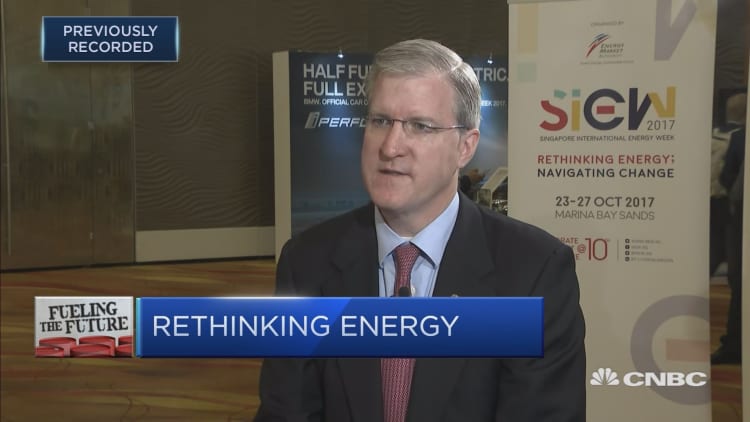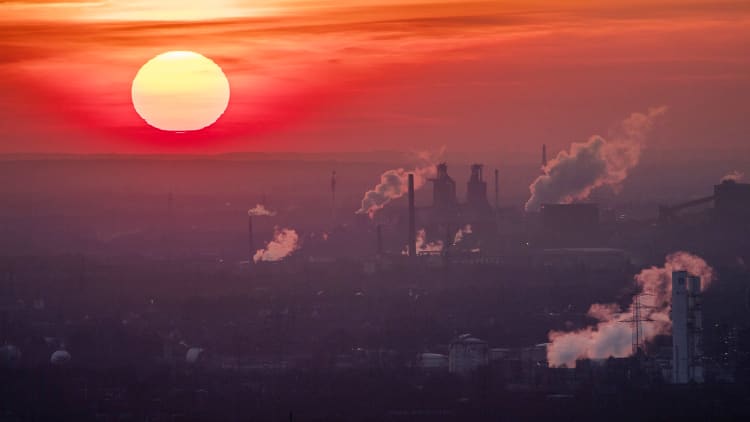During a question-and-answer period at the America First Energy Conference in Houston this month, an audience member had an inquiry for panelists at a session billed as one of the day's most important.
Why not sue the Environmental Protection Agency over its efforts to reduce carbon dioxide emissions? After all, CO2 is essential to all life on earth, he noted.
Harry MacDougald, an attorney on the panel, smiled and pointed to David Schnare, a former member of President Donald Trump's EPA transition team who had a combative relationship with climate scientists during his more than three decades at the agency. Schnare also smiled before leaning into the mic.
"We're going to do that. It won't be everybody on Earth, but ... I think we're going to look at specific farmers, large farmers who are harmed by reductions in CO2. I think that's where we're going," Schnare said.
The endangerment finding is the root of all global warming evil at the EPA.Steven Milloyauthor and former Trump EPA transition team member
The idea of suing the EPA on behalf of farmers is just one of several strategies that conservatives are pursuing in their quest for the holy grail of environmental deregulation. That prize is revoking the EPA's endangerment finding, the 2009 determination that requires the agency to regulate greenhouse gas emissions.
That finding says carbon dioxide and other greenhouse gas emissions from human activity, which trap heat in the atmosphere and warm the planet, endanger public health and welfare. The endangerment finding underpinned President Barack Obama's efforts to control emissions from automobiles, power plants, oil and gas wells and other sources.
It's little surprise, then, that the finding loomed over the entire America First Energy Conference, hosted by the Heartland Institute, a free-market think tank that has worked for years to undermine the consensus among climate scientists that human-caused emissions are the primary driver of global warming.
A major goal of the conference, preceded by a day of closed-door strategy sessions, was to continue assembling the scaffolding that will make it easier for EPA Administrator Scott Pruitt, himself a climate change skeptic, to tear down the endangerment finding. He has so far been reluctant to take up the task.

So long as the endangerment finding stands, the EPA is required to regulate greenhouse gas emissions. If it can be struck down, the Trump EPA could potentially wipe the slate clear.
"The endangerment finding is the root of all global warming evil at the EPA," said Steven Milloy, another former Trump EPA transition team member and an author who runs the climate denial website junkscience.com.
Current and former coal executives told the conference that building or restoring coal-fired plants will remain impossible so long as the finding stands.
"Every day that goes by that endangerment is in place American society is at risk," said Heartland fellow and former Peabody Energy Senior Vice President Frederick Palmer. "Every day that goes by that people are still wanting to close coal plants, American society is at risk."
Groups like the Heartland Institute have found a sympathetic ear in Trump, who has dismissed climate change as a hoax and vowed to revive the coal industry.
The Trump administration is currently reviewing Obama-era emissions rules and is widely expected to issue far less stringent regulations. Those regulations are, in turn, expected to draw lawsuits from environmentalists who will surely point to the endangerment finding.
David Doniger, director of the Natural Resources Defense Council's climate and clean air program, believes the endangerment finding will withstand any assault.
"It's built on a Mount Everest of peer-reviewed data," he said.
"Even if you were able to knock out one of them, the mountain would still stand. In fact, what they have to do is assemble a super Mount Everest of contrary evidence, and it doesn't exist."
Tearing down the endangerment finding
Rather than build that contrarian Everest, one strategy is to take apart the EPA's mountain stone by stone.
Richard Belzer, a regulatory economics consultant, encouraged conference attendees to exploit a system that lets Americans ask federal agencies to review and correct information they've disseminated to the public. The mechanism was put in place to weed out data that don't meet the agency's information quality standards.
The idea is to get the EPA to throw out hundreds of pieces of specific evidence it used to make the endangerment finding. If climate skeptics can get the Trump EPA to call into question the data behind climate policy, then a judge who later hears arguments won't have to consider the complicated scientific evidence — only the fact that the agency rescinded that evidence.
"What information quality does is it provides a procedure whereby you can convert a scientific issue into a process issue that judges can understand. That is the key to making it successful," he said.

Others are targeting just a few pillars of the endangerment finding.
MacDougald, an attorney at Caldwell, Propst & DeLoach who has long fought the endangerment finding, filed a petition this year with the EPA that challenges the science behind the determination. He believes the EPA left itself vulnerable by focusing on three lines of evidence: its baseline understanding of climate, recent temperature records and climate models created with computers.
"It's a goal post that cannot be moved," MacDougald said. "That's where they've planted the flag and that's the hill they've picked to die on, so if you kill the three lines of evidence, you have killed the endangerment finding."
To be sure, these strategies would require that EPA officials and judges buy into contrarian claims that most of the scientific community dismisses as fringe views unsupported by evidence. But Pruitt has sought to elevate those views by calling for a debate between mainstream climate scientists and skeptics. He tapped the Heartland Institute to recruit climate change deniers for the debate.
Schnare, the former member of Trump's transition team, made another point at the conference: strategies that other administrations might immediately dismiss could be embraced by Trump.
Frustration with Trump
Still, there is frustration with the president. Schnare notes that just prior to the conference, the Fourth National Climate Assessment, issued by 13 federal agencies, concluded that human activity is almost certainly the primary cause of global warming since the mid-20th century.
He blames that in part on Trump's failure to nominate someone to lead the White House Office of Science and Technology Policy.
"This president has yet to get somebody into OSTP to get their hands around the bad science," he told the conference. "If you have that report sitting out there and then Scott Pruitt decides he's going to put a bunch of people in a room and come up with a different report, now you have competing reports," he told the conference.
Myron Ebell, who led Trump's EPA transiton team, also criticized the president for not quickly nominating people to positions where they can steer the agenda. He noted that Trump waited until last month to nominate Kathleen Hartnett White, a prominent climate change denier, to lead the White House Council on Environmental Quality.
"The major failing of the Trump administration is the totally dysfunctional personnel process," Ebell, director of the Center for Energy and Environment at the Competitive Enterprise Institute, told CNBC on the sidelines of the conference.
"It seems to stem directly from the president. He has said several times that he doesn't think we need to fill all these jobs, and ... at least some people in the White House think that they can run the entire government out of the White House. Well, that's incredibly naive."
This is the second in a series of reports from CNBC on the growing influence of climate change skeptics on environmental and energy policy under the Trump administration. Read the first report on how skeptics plan to pressure Trump here.
WATCH: US states and cities are still working on climate change efforts



